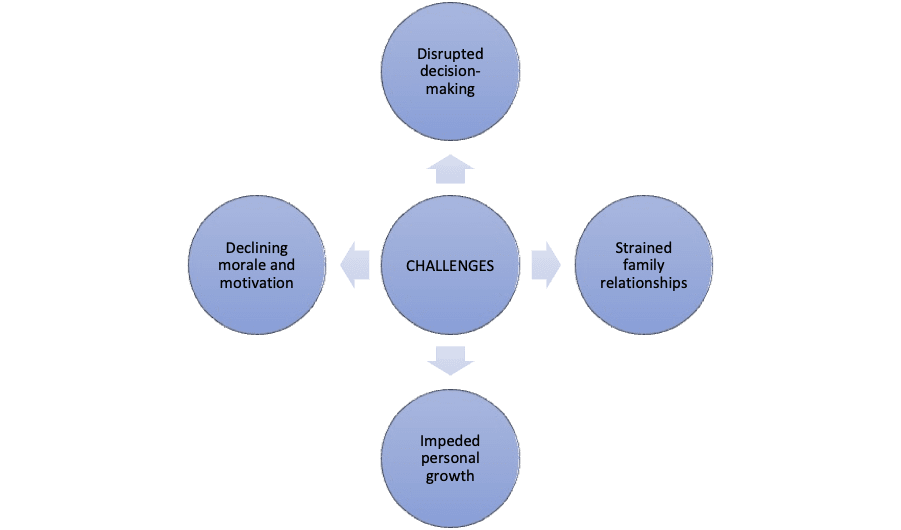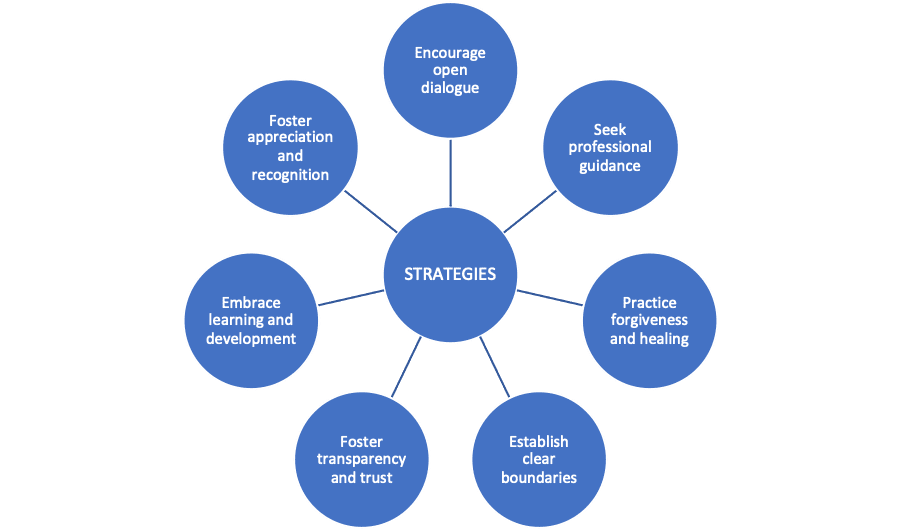Reconciling Past Hurts for Collective Growth
Family-owned businesses are unique entities that intertwine personal relationships and professional aspirations. However, conflicts within a family business can arise when unresolved past hurts and injustices disrupt the collective happiness, well-being, and decision-making processes. This article explores the impact of personal issues on family businesses and provides valuable strategies for healing and creating a harmonious environment conducive to both personal growth and business success. Fig 1 gives a summary of the associated challenges and strategies.


Fig 1: The Challenges and The Strategies
The Impact of Personal Issues on Family Business dynamics
When personal issues stemming from past hurts and injustices permeate a family business, it can significantly impact its operations and the well-being of family members involved. Some common challenges that can arise include:
Disrupted decision-making
Personal issues can cloud judgment, leading to irrational decision-making. This can cause disagreements, stalemates, and hinder the progress of the business. Emotional biases and unresolved conflicts may obscure judgment, impede strategic planning and dampen the collective spirit of the family.
Strained family relationships
Unresolved past hurts and injustices can strain family relationships, creating tension, resentment, and an unhealthy work environment. This can negatively affect communication and collaboration within the business and jeopardises the overall well-being and happiness of the family.
Impeded personal growth
Individual family members may find it challenging to focus on personal growth and development due to the emotional baggage carried from the past. This can hinder personal growth and wellbeing of the individual, as well as their professional growth within the business and limit its overall potential.
Declining morale and motivation
When personal issues remain unaddressed, it can lead to a decline in morale and motivation among family members, affecting their dedication and commitment to the business’s success and to the family’s unity and strength.
Strategies for Reconciliation and Collective Growth and Success:
To address personal conflicts within the context of a family-owned business, consider the following strategies:
Encourage open dialogue
Create a safe and non-judgmental space for family members to express their emotions, concerns, and past hurts. Encourage active listening and empathy, allowing everyone to share their experiences and perspectives.
Seek professional guidance
Engage the services of a family business advisor or therapist who specialises in family dynamics. A neutral third party can help facilitate productive conversations, offer insights and strategies for healing past wounds, and provide tools for reconciliation and growth.
Practice forgiveness and healing
Encourage family members to acknowledge past hurts and work towards forgiveness. This process can involve individual and collective healing exercises, such as therapy, meditation, or forgiveness rituals, to let go of lingering resentments.
Establish clear boundaries
Clearly define roles, responsibilities, and decision-making processes within the family business. Establishing boundaries can help manage conflicts and prevent personal issues from interfering with the business’s smooth functioning.
Foster a culture of transparency and trust
Promote open and honest communication within the family business. Encourage regular family meetings, where everyone can share updates, concerns, and goals. These meetings provide an opportunity for open dialogue, conflict resolution, and shared decision-making. Building trust is essential for creating an environment where conflicts can be resolved and decisions made collectively.
Embrace continuous learning and personal development
Encourage family members to invest in personal growth and development. This can involve attending workshops, seminars, or engaging in activities that enhance emotional intelligence and interpersonal skills. This will enhance their skills and equip them to navigate personal issues more effectively within the business context.
Foster a culture of appreciation and recognition
Celebrate individual achievements and contributions within the family business. Creating a culture of appreciation and recognition promotes positive reinforcement, motivates family members, and strengthens the collective bond.
Conclusion
Personal conflicts rooted in past hurts can significantly impact the collective happiness and success of both the family and the business. By fostering open dialogue, seeking professional guidance, promoting forgiveness, establishing clear boundaries, fostering transparency and trust, and embracing personal growth, families can navigate these conflicts and create a harmonious balance between personal healing and business growth. Addressing personal issues within the family business requires patience, empathy, and a commitment to the shared well-being of both the family and the business. It is a journey that requires patience, but the rewards are immeasurable—a thriving family business that nurtures both the professional and personal well-being of its members
